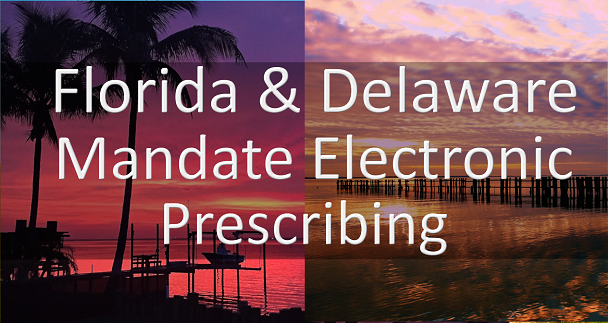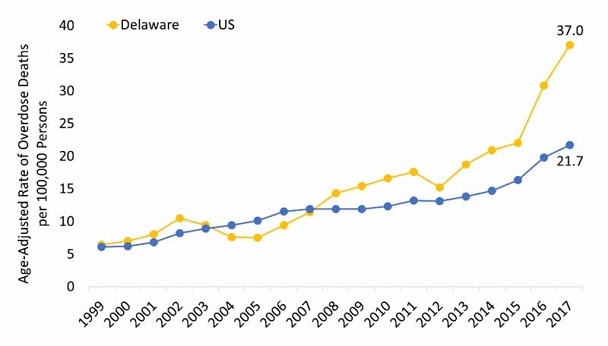

----- Blog Index / Florida-and-Delaware-Mandate-Electronic-Prescribing [MDToolbox Staff] [2019-07-10]

Florida and Delaware Governors Ron DeSantis and John Carney have both recently signed electronic prescribing mandates into law. Florida HB831 mandates healthcare providers to electronically prescribe all medications with an effective date of either July 1st, 2021, or upon license renewal (beginning January 1st, 2020). This bill was a bipartisan initiative that was amended several times in both the house and senate before being enacted. Delaware HB115 mandates healthcare providers to electronically prescribe all medications with an effective date of January 1st, 2021.
Other subsections of the Florida Act include:
Other subsections of the Delaware Act include:
Florida is currently above the national average for opioid-related overdose deaths, with 16.3 deaths per 100,000 people while the national average is 14.6 deaths. Prescription opioid overdose deaths continued to gradually rise until 2011, then decreased until 2015. Heroin, prescription Opioids, and synthetic opioid deaths have all risen drastically since then.[1] Florida implemented their PMP in 2011 and also began restricting some controlled substances. In 2017, Florida declared a state of emergency due to the Opioid epidemic and began writing additional legislation. HB21 was a major change enacted in 2018 that required usage of the State Prescription Monitoring Program (PMP), required additional opioid training for prescribers, and placed limitations on the number of pills that can be prescribed.

Delaware is also currently above the national average for opioid-related overdose deaths, with 21.7 deaths per 100,000 people while the national average is 14.6 deaths. Overdose deaths remained consistently above the national average from 2008 to 2016 and have risen drastically in 2016 and 2017 with 37.0 deaths per 100,000 people in 2017.[2] Delaware enacted legislation that restricted opioid prescriptions to 7 days beginning in 2017. Long-term opioid treatment is available, but only after certain criteria is met including regular queries of the State Prescription Drug Monitoring Program.
Florida currently has a 15.3% prescriber enablement for electronic prescribing of controlled substances; Delaware has a 20.3% prescriber enablement. Both states are significantly below the national average of 35.4%. Pharmacy enablement in Florida for EPCS is 92.9% which is the second lowest of any State in the US. Delaware currently has a 99.5% pharmacy enablement, the national average is 95.4%.[3] MDToolbox encourages providers not to wait until the last minute to setup electronic prescribing!
Please see our website for other states that have either passed or have pending legislation that mandates electronic prescribing. MDToolbox looks forward to providing tools and resources to assist providers throughout Florida and Delaware to ease the transition and help our customers combat the opioid epidemic. With MDToolbox, providers have access to tools such as Electronic Prescribing of Controlled Substances (EPCS) and convenient on the go e-prescribing with our mobile app! We offer a free 30 day free trial, so Contact us for more information!